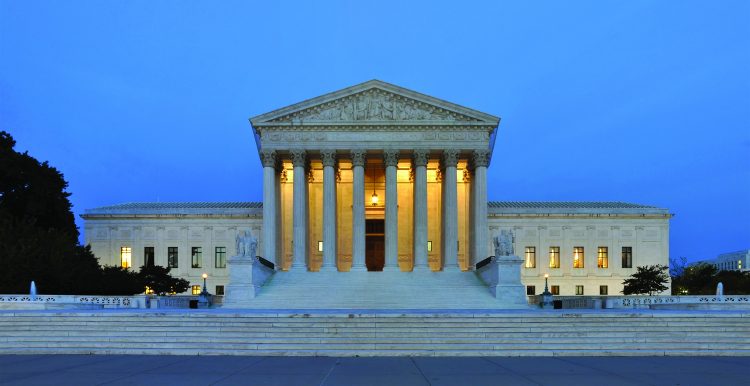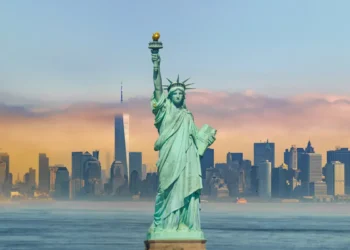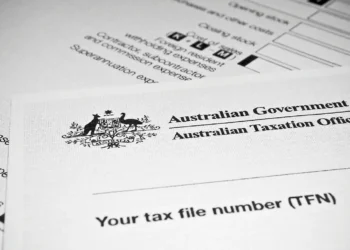The big news coming out of the United States this year is the likely striking down of the federal ban on sports betting. But with many states licking their lips in anticipation of added tax dollars, the sports betting industry may well have another crippling fight on its hands.
THE US Supreme Court appears to be about to rule that the federal law that prevents states from legalizing sports betting, the Professional and Amateur Sports Protection Act (PASPA), is unconstitutional. There are at least a dozen states that appear ready to enact new laws to introduce or expand legal intra-state wagering on sporting events this year, once the High Court decision is announced.
This raises, as always, the question of who will get the money.
Indiana Rep. Alan Morrison has introduced a bill that would give the national sports leagues 1% of the new sports betting handle as an “integrity fee.” The sports governing bodies, of course, think this is a great idea. But is imposing a 1% fee on gross gaming wagers in addition to a proposed 9.25% state tax on gaming revenue, on top of the existing 0.25% federal excise tax on the handle a good idea for operators?
In 2008, the State Legislature of Delaware was considering reopening sportsbooks in racinos, which the state was allowed to do, because it had been grandfathered in under PASPA. I was retained as the legal consultant by the Delaware State Lottery, which runs all sports betting, to advise the state on what the tax rate should be on the new sportsbooks.
I prepared a report and recommendations. The following is a simplified version of the report’s discussion of the impact of taxes on operators. I follow this with a quick analysis of the Indiana plan, which appears to be spreading across the country.
HISTORY
In 1954, Congress imposed a 10% federal excise tax on all sports wagers, legal and illegal. This tax was so high that it was virtually impossible for even the best sports handicappers to win consistently. Licensed sportsbooks were limited to Nevada. At the time these were called turf clubs, were limited in number, small in size and not connected with large casinos. Individuals who worked in the industry during this time reported widespread tax evasion to get around this high tax. For example, a $1,100 bet to win $1,000 was recorded as merely $11 to win $10.
Sportsbooks make their profit from the statistical advantage they have over their patrons. The most common wager is a multiple of $11 to win $10. If the sportsbook succeeds in having the same amount of money wagered on both sides of a match, it is guaranteed to make a profit. For example, if Patron A bets $11 on his team and Patron B bets $11 on the opposing team, the sports book now has $22, but the sportsbook pays the winner, whoever he may be, only $21, his original $11 bet back and his $10 in winnings. The sportsbook keeps the additional $1.
It is easy to see why the 10% tax would be devastating if it could not be passed on to the patrons. Of the $22 bet in the example above, the federal government would take $2.20, obviously much more than the sportsbook’s expected $1 profit. But the 10% tax could not be passed on, because the patrons would no longer be betting $11 to win $10, but rather $11 plus 10% ($1.10) for a total of $12.10 to win $10.
Sportsbooks allow patrons to make a wide variety of bets. The “hold” is the percentage that the sportsbook wins. In Nevada, slightly more than US$22.5 billion was bet over a 10-year period and the sportsbooks had gross gaming revenue of about US$938 million, which means they kept 4.16% of the amounts bet.
Looking at a single sportsbook: if it has a handle of US$10 million – the total amount bet in a year – and it holds 4.16%, it will win, or have gross gaming revenue, of US$416,000. But when the federal excise tax on wagers was 10%, the federal government demanded US$1 million (10% of the US$10 million bet). If the sportsbook had to pay this, it obviously could not; it would be like imposing a 240% tax on gross gaming revenue.
In 1974, Congress lowered the federal excise tax on sports wagers to 2%. Using the same numbers for comparison purposes, a sportsbook with a handle of US$10 million and a hold of 4.16% – therefore producing a win of US$416,000 – now only had to pay the federal government US$200,000. This is equivalent to a tax on gross gaming revenue of 48.07%. Nevada also has a sliding scale of state gaming taxes, with the top tax rate quickly reaching 6.75% of gross gaming revenue. Therefore, the lowering of the federal excise tax to 2% allowed sportsbooks in Nevada to operate and pay the equivalent of approximately 54.82% on their win.
This was low enough to allow a few entrepreneurs to think about expanding the small turf clubs into true sports betting parlors. In 1975, the Nevada Legislature passed enabling legislation so that casinos could have sportsbooks. But the tax rate was so high that few casinos were willing to devote any of their valuable floor space to a form of gambling that generated so little to the bottom line.
In 1983, Congress lowered the federal excise tax on legal sports wagers to 0.25% (illegal sports bets still pay 2%). A sportsbook with a handle of US$10 million and a hold of 4.16% producing a win of US$416,000 now only had to pay the federal government US$25,000 (0.25% times US$10 million). This is equivalent to a tax on gross gaming revenue of 6.01% (US$25,000 divided by US$416,000). Nevada’s top tax rate of 6.75% means the sportsbooks were now paying the equivalent of approximately 12.78% of gross gaming revenue (6.01% federal plus 6.75% state taxes).
The direct result of having gaming privilege taxes at about 13% of gross gaming revenue for legal sportsbooks was an explosion of growth and capital expenditures for Nevada’s sports betting industry. In 1973 there were only 10 sportsbooks with a total handle of US$2.8 million. Twenty years later there were approximately 100 sportsbooks with a total handle in excess of US$2 billion. By the year 2000 there were about 157 sportsbooks, with a total handle greater than US$2.5 billion, generating more than US$117 million in gross gaming revenue.
Sportsbooks not only became large and numerous in Nevada, they were viewed as profit centers and entertainment enticements for commercial casinos. By 1985 all of the small independent sportsbooks were closed, replaced by multi-million dollar casino sportsbooks with dozens of giant video screens and all the other services sports bettors could want, including easy access to other forms of gambling.
IMPACT OF THE PROPOSED 1% TAX
Here is how the same analysis would work using the numbers proposed for Indiana, which is a 1% “integrity fee” on handle, a 9.25% state tax on gaming revenue and the existing 0.25% federal excise tax on handle:
A sports book with a handle of $10 million and a hold of 4.16% producing revenue of US$416,000 would pay the sports leagues US$100,000 (1% times US$10 million). This is equivalent to a tax on gross gaming revenue of 24.04% (US$100,000 divided by US$416,000).
The federal government receives $25,000 (0.25% times US$10 million), which is equivalent to a tax on gross gaming revenue of 6.01% (US$25,000 divided by US$416,000).
The state receives US$38,480 (9.25% times US$416,000).
The total in fees and taxes would be US$163,480. The operator gets to keep US$252,530 (US$416,000 minus US$163,480).
So operators would be paying the equivalent of 39.3% of gross gaming revenue (24.04% integrity fee plus 6.01% federal excise tax plus 9.25% state taxes). Another way to get to the same result: US$163,470 divided by US$416,000.
In other words, the bookie takes in US$10 million in bets, pays the leagues US$100,000, the feds US$25,000 and the state about US$38,000. This leaves the operator with about US$250,000 to pay all of its expenses. Whatever is left, if any, is profit.
It is hard to know how many bets a sportsbook in Indiana, or anywhere else for that matter, would actually have in a year. And expenses would vary over time and among sportsbooks. There would also be fixed costs, such as building the facility, and variable costs, which would increase or decrease depending upon the number of bettors. But we can get some guidance from the numbers from Nevada.
The most recent official figures show that for the 12 months ending in November 2017 there were 195 sports books in Nevada. They won a total of US$233,299,000. Dividing the total win of approximately US$233 million by the number of sportsbooks, 195, means the average Nevada book wins about US$1.2 million a year.
The reported win percentage was 4.82%. This includes parlay cards and parimutuel bets, where the house keeps a much larger share. Still, using the reported hold of 4.82% means the average sportsbook in Nevada accepts almost US$25 million a year in bets (US$1.2 million divided by 4.82%).
Put that average sportsbook in Indiana and you get US$25 million in bets a year, revenue of US$1,040,000 (US$25 million times a hold of 4.16%). Out of that win of about US$1 million a year, the Indiana sports book would have to pay US$250,000 to the leagues, US$62,500 in federal taxes and US$96,200 in taxes to the state. This leaves the sportsbook again with revenue of about 2.5% of wagers or US$631,300. Out of that US$631,300, the operator has to pay all other expenses, including other taxes, such as property and income taxes.
This is not EBITDA – Earnings
Before Interest, Taxes, Depreciation and Amortization. That is how investors measure cash flow. The US$631,000 is only revenue, after the gambling privilege taxes and fees have been paid. It does not yet take into account all expenses and all other taxes.
I personally would never invest a cent into a business like this.


































